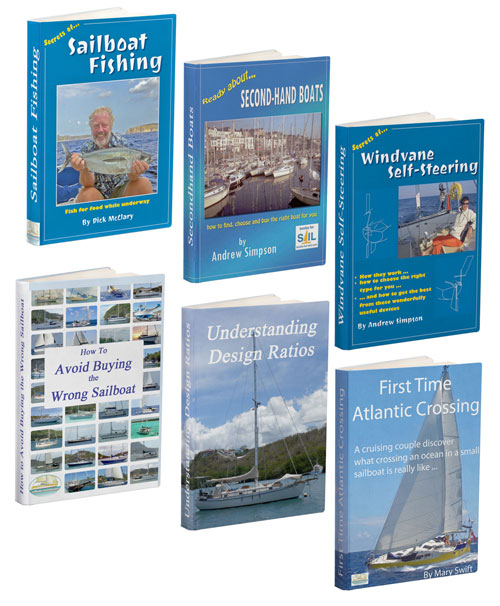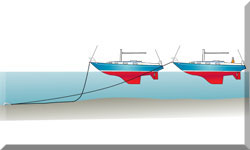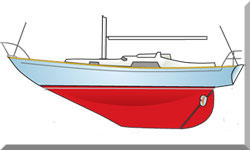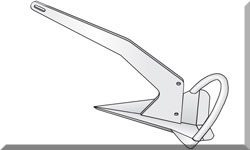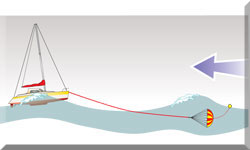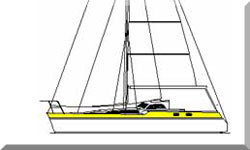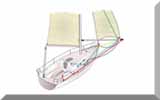- Home
- Buying a Used Sailboat
- True Cost of Boat Ownership
- Do I Need Boat Insurance
Do I need Boat Insurance Insurance?
It's not cheap, yacht insurance. Still, is it really wise to take your chances? Even if some countries don't legally require it, protecting your vessel and your wallet makes good sense.
Whether your boat is modest in size or a treasured investment, here are some compelling reasons—and fresh insights—to consider before you set sail without proper cover.
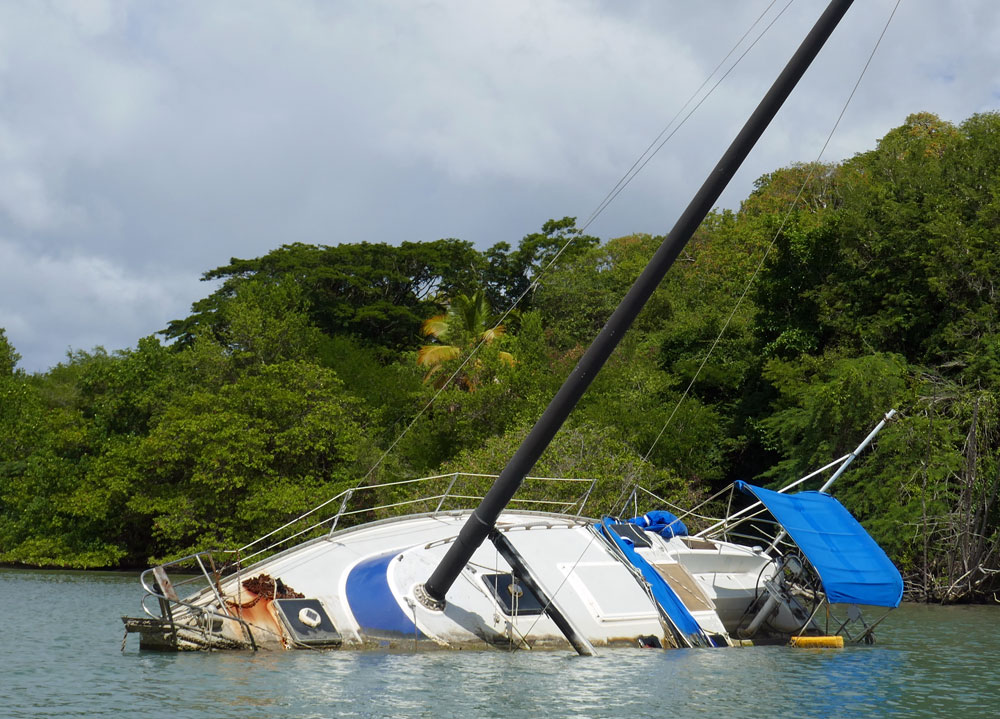 The sad result of a broken mooring...
The sad result of a broken mooring...1. Damage to Other Vessels:
Even if your boat isn’t very valuable, a collision could result in serious damage to another, more expensive vessel. If you're found at fault, you'll wind up paying for hefty repairs on someone else's boat, not to mention potential legal claims and other costs.
2. Protecting Your Investment:
Your boat is more than just a toy on the water—it’s an investment. Without insurance, any loss or damage might leave you unable to repair or even replace it.
3. Operational Restrictions Without Insurance:
Believe it or not, not having the right insurance can limit how and where you can keep your boat. Many marinas, storage yards, and even local moorings require proof of a certain level of third‑party cover before accepting your vessel.
4. International Requirements:
If you plan to take your boat overseas, customs and immigration officials will almost certainly want to see a valid insurance certificate. Don’t let an unexpected port call turn into a regulatory nightmare.
So yes, no matter your boat’s size or your cruising ambitions, yacht insurance is essential.
Modern Coverage and Technological Innovations
Today’s insurance policies have evolved far beyond basic coverage. Many companies now offer parametric insurance and telematics-driven policies—meaning your premiums can adjust based on real-time sailing data. For example, if your boat is equipped with a state‑of‑the‑art tracking or weather‑alert system, safe sailing habits might even earn you a discount. This isn’t just futuristic talk; it’s a genuine trend that rewards vigilance and modern technology.
Additionally, as environmental concerns rise, insurers have begun to include enhanced environmental and pollution liability coverage. Imagine having protection that not only covers physical damage but also tackles cleanup costs and legal fees if your vessel accidentally pollutes pristine waters. This added layer of security is increasingly important, especially if you navigate ecologically sensitive areas.
For those sharing the deck with crew or chartering their vessel, modern policies often extend to crew, charter, and personal accident cover. That way, whether you're hosting guests or setting sail with a dedicated crew, everyone’s protected—from mishaps on board to unexpected medical emergencies.
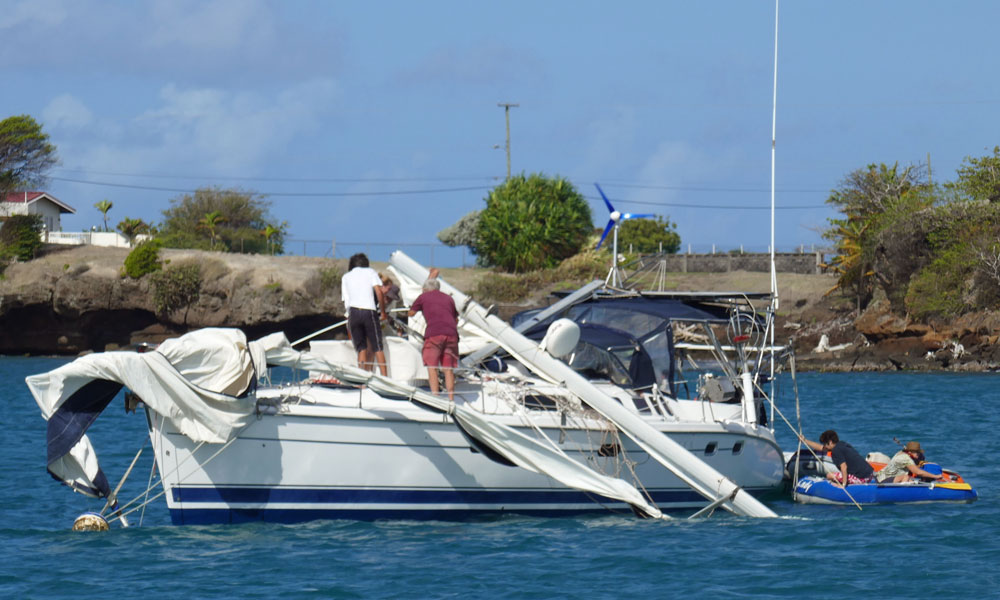 The failure of a single fitting caused the loss of the entire rig...
The failure of a single fitting caused the loss of the entire rig...What Risks Should You Want Covered?
When determining your needs, start with the basics, then build upward with modern enhancements.
Standard Risks
- Accidental Damage to Equipment: From the hull and sails to machinery and personal effects, your policy should cover accidental damage. This also means protection against fire, frost, theft, and even malicious damage. And yes, if your boat sinks, runs aground, or collides with another vessel, you want those repair bills covered.
- Launching and Hauling Out: If launching your boat or hauling her out for maintenance is part of your routine, make sure these activities are insured too. For those with tenders, outboard motors, or a trailer, add-on coverage for transit or trailer mishaps is a must.
- Modern Additions: Think about new risks as well—equipment fitted with modern technology might offer discounts, but you should verify that any high-tech add-ons are covered.
Special Risks
For long-distance sailors or those venturing far from home waters, special risks come into play.
- Hurricane Insurance & Local Hazards: In regions like the Caribbean, hurricane insurance isn’t just a nice-to-have—it's critical.
- Piracy and International Waters: If you’re sailing in areas known for piracy, understand that obtaining cover might be a challenge. Always check what special exclusions may apply in these regions.
Understanding Premiums, Limits, and the Claims Process
While you explore your options, getting to grips with premium calculation factors, coverage limits, and deductibles is crucial. Here’s what to keep in mind:
- Premium Factors: Your boat's age, size, cruising area, storage conditions, and past claims all play a part in determining what you pay. Investing in quality safety equipment or advanced monitoring systems can sometimes reduce your premium.
- Coverage Limits and Deductibles: It's important to know exactly how much the insurer will pay out in a claim and what your deductibles will be. Real-world examples can illustrate what a "reasonable" deductible looks like for sailboats versus larger yachts, ensuring you’re not caught off guard when filing a claim.
- Clear Liability Coverage Details: Beyond physical damage, liability coverage should extend to passenger injuries, legal defense costs, and scenarios specific to charter use. Always review exclusions carefully so nothing sneaks into the fine print.
- Claims Process and Customer Service: In the event of an incident, knowing the step-by-step claims process can be a lifesaver. Look for insurers offering 24‑hour helplines and clear, concise instructions. A well-outlined, digital flowchart or checklist can help guide you through gathering documentation, speaking with adjusters, and ultimately ensuring a smooth resolution.
- Regulatory and Local Legal Requirements: Keep in mind that local standards differ. Whether in the EU, Caribbean, or Asia, find out what local moorings, marinas, or customs officials expect in terms of an insurance certificate. A simple checklist outlining the legal prerequisites for your cruising destinations can offer peace of mind.
Finding a Yacht Insurance Company
Most sailboat owners prefer working with specialist insurance brokers rather than booking directly with large providers. An internet search will yield many options, but don’t be lured solely by the cheapest quote. It pays to ask detailed 'what if' questions to understand every aspect of your policy.
When reviewing your options, make sure you assess:
- Risks Covered vs. Exclusions: Understand exactly what is covered and what isn’t – the exclusions are just as important as the inclusions.
- The Fine Print: Discuss terms, conditions, and any ambiguous clauses with your broker. For example, what if you must abandon the boat mid-ocean? Or how does the policy handle a latent construction defect? Even quirky scenarios, such as termite infestations, should be clarified.
- Reputation and Claims Performance: Before signing on, ask about the insurer's claims history. A broker or insurer’s past performance—like the way one company swiftly managed a claim after hurricane damage—can offer crucial insights. It isn’t just about winning the quote; it’s about knowing you have reliable support when trouble arises.
Engaging With the Process: Tips, Tools, and Multimedia
To help you get the most out of your research:
- Digital Tools and Comparison Websites: Use interactive calculators and online reviews to swiftly compare quotes and coverage levels. These tools help clarify how factors such as boat age, cruising area, and equipment upgrades affect your premium.
- Infographics and Videos: Look for multimedia content like infographics that break down your policy into sections—hull and machinery, third‑party liability, personal effects—and animated videos explaining the claims process. Real-life testimonials and case studies can provide valuable, relatable insights.
- Downloadable Checklists: A “Before You Sign Up” checklist can ensure you cover all bases before committing. This might include reviewing exclusions, verifying local legal requirements, and confirming that coverage aligns with your sailing habits and planned routes.
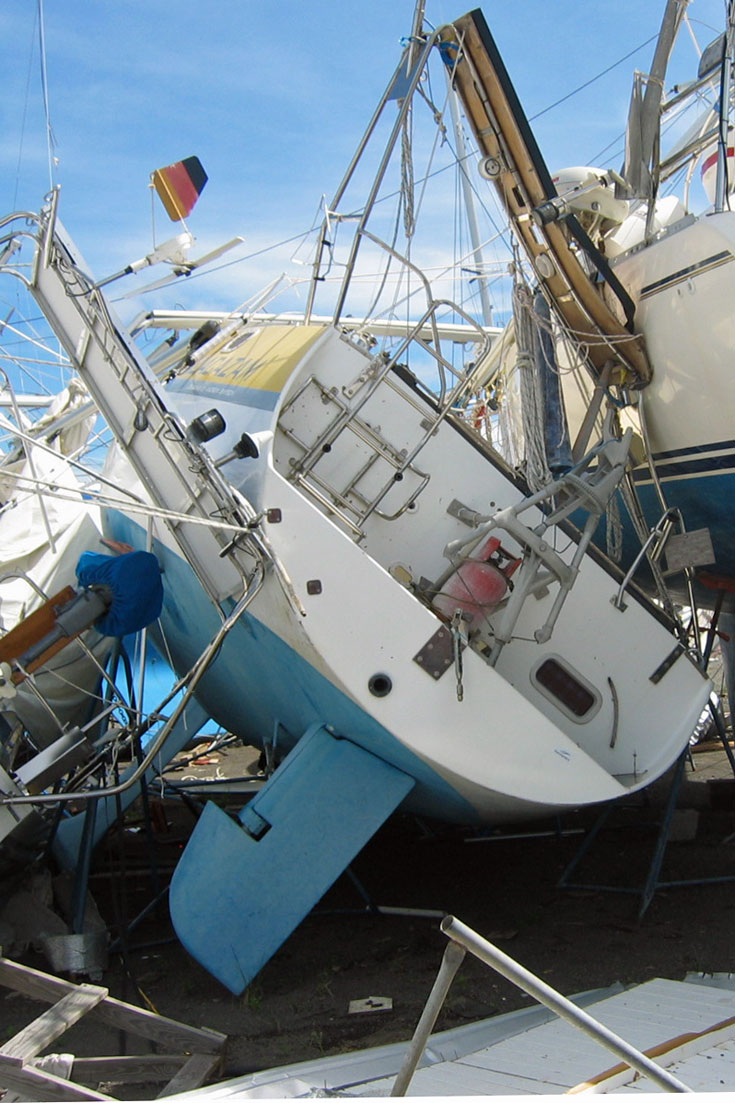 The devastating results of a category 5 hurricane...
The devastating results of a category 5 hurricane...Final Thoughts...
In a modern era where technology infuses every part of our lives—even yacht insurance—it's essential to combine traditional wisdom with contemporary tools.
Embrace innovations like telematics and enhanced environmental cover while staying grounded in the basics: understand premium factors, limits, and how the claims process works. Whether you’re cruising locally or venturing into international waters, a well‑tailored insurance policy keeps you afloat, protecting your investment, your adventures, and your peace of mind.
Next - Sailing Travel Insurance...
Recent Articles
-
Is Marine SSB Still Used?
Apr 15, 25 02:05 PM
You'll find the answer to this and other marine SSB-related questions right here... -
Is An SSB Marine Radio Installation Worth Having on Your Sailboat?
Apr 14, 25 02:31 PM
SSB marine radio is expensive to buy and install, but remains the bluewater sailors' favourite means of long-range communication, and here's why -
Correct VHF Radio Procedure: Your Questions Answered
Apr 14, 25 08:37 AM
Got a question about correct VHF radio procedure? Odds are you'll find your answer here...
